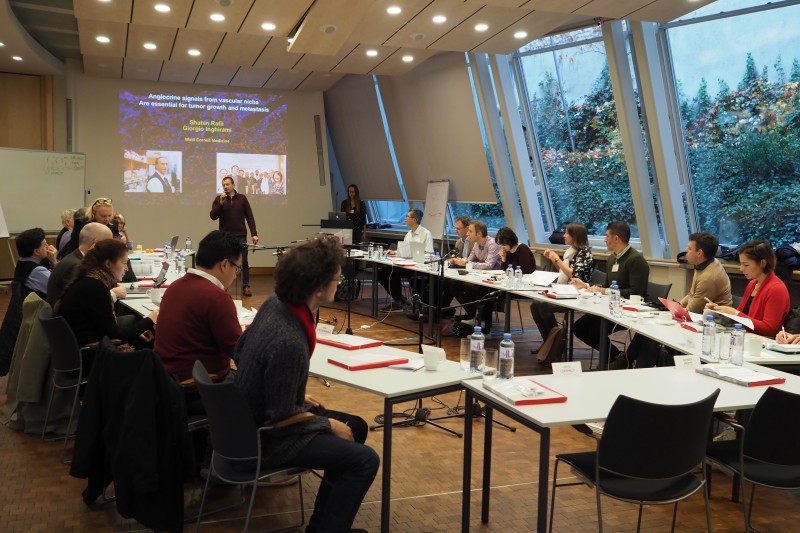KLI Colloquia are invited research talks of about an hour followed by 30 min discussion. The talks are held in English, open to the public, and offered in hybrid format.
Join via Zoom:
https://us02web.zoom.us/j/5881861923?omn=85945744831
Meeting ID: 588 186 1923
Spring-Summer 2026 KLI Colloquium Series
12 March 2026 (Thurs) 3-4:30 PM CET
What Is Biological Modality, and What Has It Got to Do With Psychology?
Carrie Figdor (University of Iowa)
26 March 2026 (Thurs) 3-4:30 PM CET
The Science of an Evolutionary Transition in Humans
Tim Waring (University of Maine)
9 April 2026 (Thurs) 3-4:30 PM CET
Hierarchies and Power in Primatology and Their Populist Appropriation
Rebekka Hufendiek (Ulm University)
16 April 2026 (Thurs) 3-4:30 PM CET
A Metaphysics for Dialectical Biology
Denis Walsh (University of Toronto)
30 April 2026 (Thurs) 3-4:30 PM CET
What's in a Trait? Reconceptualizing Neurodevelopmental Timing by Seizing Insights From Philosophy
Isabella Sarto-Jackson (KLI)
7 May 2026 (Thurs) 3-4:30 PM CET
The Evolutionary Trajectory of Human Hippocampal-Cortical Interactions
Daniel Reznik (Max Planck Society)
21 May 2026 (Thurs) 3-4:30 PM CET
Why Directionality Emerged in Multicellular Differentiation
Somya Mani (KLI)
28 May 2026 (Thurs) 3-4:30 PM CET
The Interplay of Tissue Mechanics and Gene Regulatory Networks in the Evolution of Morphogenesis
James DiFrisco (Francis Crick Institute)
11 June 2026 (Thurs) 3-4:30 PM CET
Brave Genomes: Genome Plasticity in the Face of Environmental Challenge
Silvia Bulgheresi (University of Vienna)
25 June 2026 (Thurs) 3-4:30 PM CET
Anne LeMaitre (KLI)
KLI Colloquia 2014 – 2026
Event Details

Topic description / abstract
Since its publication in February 2021, the Dasgupta review, titled “The Economics of Biodiversity,” has had a strong impact. The report invites us to consider nature as an “asset,” or a form of “capital,” whose value should be measured using controversial indicators and methodologies. The contributions of this capitalized nature to human societies would have then to be referred to as “ecosystem services”—the Dasgupta review devotes a full chapter to them. The literature on “natural capital” and “ecosystem services” has developed since the 1990s, but the concept of “nature’s services” is actually much older: we can find traces of it at least in the work of Alexander von Humboldt at the turn of the 19th century. One episode deserves special attention: the intertwining of economic and ecological expertise between the 1880s and the 1920s in the United States. At that time, some economists, ecologists, biologists and professionals of all kinds worked on the “services of nature,” particularly in forestry and agriculture. The concept of “natural capital” was also coined at that moment. The purpose of this presentation will be, therefore, to review that episode and to draw some lessons on the role of economic words in our understanding of environmental challenges. Economic imperialism, disciplinary hybridization, the role of biology and ecology in economics… these topics will be discussed to show how conceptual history can help answer the question: do economic words harm sustainability?
Biographical note
Antoine Missemer is a CNRS researcher currently working at CIRED - Centre international de recherche sur l'environnement et le développement (Paris, France). He holds a PhD in economics from the University of Lausanne. His interdisciplinary work focuses primarily on the history of environmental, energy, and natural resource economics, i.e. on how the economic discipline and economists have approached energy and ecological transition in the past. He is the author of several books (in French) and articles (in French and English) crossing the history of ideas and sustainability issues. His is currently working, with Marco P. Vianna Franco (KLI), on a history of the relationship between economics and the science of ecology, to be published by Routledge.


